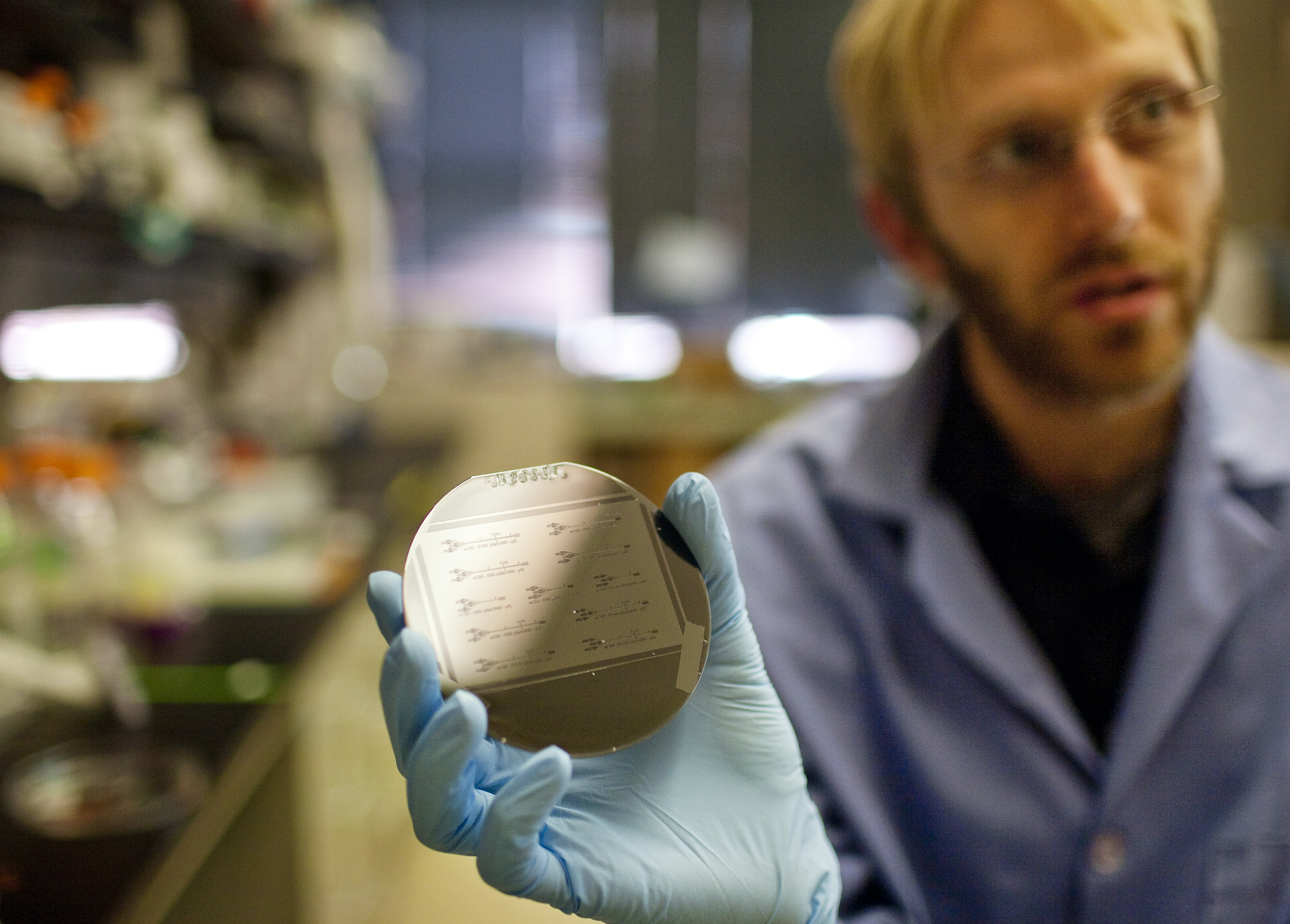UCLA professor wins Young Investigator’s Award for development of microfluidic devices

Dino Di Carlo shows off the wafer with the pattern used to develop microfluidic devices.
By Kristen Taketa
April 20, 2012 12:37 a.m.

UCLA assistant professor Dino Di Carlo won a Young Investigator Award from the Office of Naval Research for his work in microfluidics.
In graduate school, Dino Di Carlo’s worst grade came from his microfluidics class.
But by the time he came to UCLA as an assistant professor six years later, he had created a new sub-field of microfluidics and established a lab that would go on to win several awards.
“That’s the interesting thing,” Di Carlo said. “When you get the worst grade in something, you look at everything from a fresh (perspective).”
Di Carlo, 30, won a Young Investigator Award from the Office of Naval Research late last month for his work in microfluidics in his 4-year-old lab. The award is given to young researchers whose technology can be potentially used to help the U.S. Navy and Marine Corps.
Microfluidics, which Di Carlo’s lab researches, involves the manipulation of fluids to arrange cells in a way the cells can be examined or sorted. Di Carlo won the award for working to develop filter technology that could selectively catch particles of certain sizes.
The filter could potentially provide the Navy with a more compact way to prepare blood transfusions for military personnel and filter debris from seawater.
The Navy currently uses water filters that continually have to be replaced. The filter could be cleaned out and be used repeatedly, making it easier for a Navy ship to stay longer out at sea, Di Carlo said.
When he was young, Di Carlo watched plants grow in his father’s garden, intrigued by how something as small as a seed could develop into its own reproducing complex structure. His interest proved to be a signal of a future career.
As a middle school student in Monterey, Calif., Di Carlo said he would read his mother’s textbooks and ask her questions about medicine as she trained to become a nurse. This piqued his desire to develop technology with medical applications that could help doctors and nurses treat patients.
When he started graduate school, Di Carlo said he was initially not very interested in fluids and had little background in the area.
But, in some cases, not having the background can help. “Since I didn’t know it well enough, I made connections that other people didn’t make before,” Di Carlo said.
While studying at graduate school, Di Carlo noticed that, depending on the size and shape of a channel of fluid, cells flowing inside did not scatter randomly, but arranged themselves precisely due to the laws of inertia.
“It was an accident,” Di Carlo said. “I was trying to do something completely different, and then I saw the cells align in these beautiful lines.”
Di Carlo’s observation went against what every professor had taught him, namely that inertia did not need to be considered in microfluidics.
“But I guess I wasn’t taught it very well,” Di Carlo said with a laugh. “Because in the end, I realized that we have to consider it as important in this case.”
The discovery led to the creation of a new sub-field called inertial microfluidics.
Benjamin Wu, the chair of the bioengineering department at UCLA, was one of the people who hired Di Carlo when he applied to UCLA. Wu had considered hiring other applicants in addition to Di Carlo.
“We just never thought that they were doing anything that different, until Di Carlo came to give his seminar,” Wu said. “It was clear that when he gave his talk ““ that was new, that was different.”
Di Carlo works to apply his passion for science and his appreciation for creativity while working in the lab.
“When I come in with some data, you’ll see his face lighten up,” said Albert Mach, a graduate student in Di Carlo’s lab. “He’s always had that attitude, and that’s what makes him a great professor.”
When working with students, Di Carlo is constantly approaching issues from a different perspective, said Danny Gossett, another graduate student of the microfluidics lab.
Di Carlo also allows his students more freedom to do what they want in order to foster creativity, Gossett said.
Di Carlo said he wants students to consider not discarding what they see even if it does not agree with the current thinking.
“Trust your observations, and you can change a field that way.”


